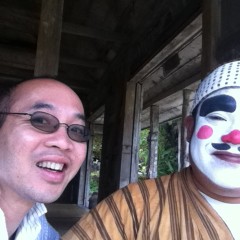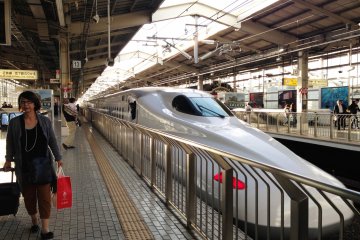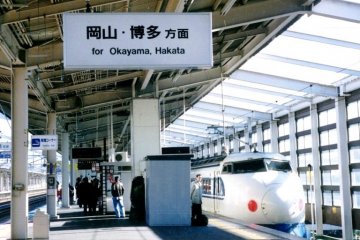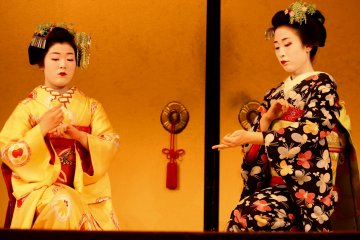Housed in a renovated Kyoto Merchant’s Machiya townhouse, this Guesthouse combines the chic style of Geneva with the hospitality of Kyoto, especially downstairs in the lounge, where the soothing jazz background music blends in with the quiet friendliness of well mannered thirty something travelers reading or chatting from Europe and around the world.
Owned by a lovely young couple who left their job to open this new venture, they were inspired so much by the kindness and hospitality they received on their travels that they wanted to bottle it and take it to Kyoto. “I want to provide independent travelers from all corners of the globe with a place for encounters that will be theirs to have forever,” says Kaori Bushimata, who after much thought opened this guesthouse in 2010.
The word “Rouji” in Kyoto refers to any narrow alley connected with a main street. Kaori named her guesthouse Roujiya from the idea that when people are traveling, they should consider deviating from the ‘main street' of their lives and explore the ‘rouji,' and take a fresh look at their minds. Everything in this machiya is new and super clean, and with a feeling of comfort and intimacy that would put many small hotels to shame. There are also authentic and homely touches, such as the antique tansu (kimono chest) in the lounge, and you can even purchase some Kutani porcelain plates, as Kaori has a keen eye for Japanese aesthetics.
When I checked in I realized I made the right choice. Admittedly I wasn’t 100 per cent convinced when I booked, even though they replied quickly to all my emails, I didn’t feel a special connection beforehand arriving. Maybe it was looking at all the rules on their website, like a strict quiet policy after 11 pm and a preference for not having children on the premises. But having stayed there you l have learnt to appreciate these rules are there to help everyone feel comfortable, and no one complained about the rules when I was there. Actually it was the guests themselves who would enforce the rules when I was there, such is the high regard they have in preserving the special charm of Roujiya.
Whilst the owners speak fluent English, Japanese nature, especially in Kyoto is more reserved than effusive, and it is in their humble tradition not to oversell themselves. Also, communicating in your second language may sometimes mean that the warmth and heart can be lost in translation. Likewise with the fellow guests, many from Germany, Switzerland and Hungary, with English being their second or third languages, there is a natural reserve in communicating in English. It is not that they don’t want to welcome or talk with you; they are just waiting for your introduction or permission to open up and share their stories. Call it good manners or humble personalities, once I have been there for a short time and have established a connection, their kindness and openness was infectious. Even when I was asking them for advice, it was more like talking with friends than some formal concierge. They wanted to know about me and what I enjoyed in my life, and when they found another guest who had a common interest, they would introduce me to him or her.
In keeping with the intimate home stay nature of a traditional machiya, this place is limited to 15 or so guests in 4 rooms, including a tatami room which is available to book for exclusive use. No more Spartan industrial sized kitchens and shower blocks that you find in many other countries. You can’t roll your luggage up the rather steep stairs (maybe this is one of the quirks of machiya design), so if you have difficulties carrying your luggage upstairs please ask them to help you, or divide your load to make it easier. There are also individual reading lights and curtains in the dormitory bunk beds should you prefer to snug up in bed with your favorite journal or iPod, and free Wi-Fi is available in all rooms. There is also a tatami room with futons that can be booked exclusively for private use if you don't want to share a dorm.
Having only one common lounge area, which is between the entrance and the upstairs sleeping rooms, it is easy to meet new friends. Roujiya Guesthouse prides itself in bringing Kyoto hospitality to the rest of the world, so whether you want to converse in Japanese or English, even single travelers will not feel alone here, being like a home away from home.
Speaking of single travelers, one of the challenges we face is feeling lonely or homesick during your travel, and even if you are in the most beautiful place in the world, you find it hard to make deep connections with the people you met.
When we travel to another place it is easy to fall into the trap of living in a parallel universe to the locals. You could be on the same road, same airport, breathing the same air, but there is an invisible barrier that stops you from really connecting, from being part of the place instead of being on the outside, looking in.
In this regard, the staff and guests at Roujiya seem like God’s gift to you. They not only want to share with you about their deep connections with Kyoto, but also by opening up their home and their lives, to be friends that you can come back to, again and again. Likewise, many guests here have a deep knowledge of Japan and traveling, and so it is great to find a kindred spirit.
The location also facilitate in making deeper connections with this ancient town. Set in a back street in an authentic local area relatively untouched by modern tourism, it is enjoyable just strolling past the family owned shop houses making kitchenware and other handicrafts for generations or the local playground filled with laughing kids and teenagers practicing baseball. If you cooking takes your fancy, try the cooking class hosted by Kaori in the communal kitchen. Roujiya also hires bicycles for 500 yen a day and you can while away a lazy morning losing yourself in the local neighborhood. The grid pattern and the flat terrain, combined with comfortable well maintained bicycles make this activity accessible to even the uninitiated cyclist. Just bring a map/ name card of the Guesthouse, a Japanese dictionary on your smartphone and some money in case you do get lost or find the local grandma’s ramen shop too irresistible to go past.
Roujiya is also close to the world heritage sites in Arashiyama, and if you get there early in the morning, chances are you can avoid the crowds and have the bamboo forests to yourself.
While you are in the area, try out the local sento, or public bath house. A long time ago, Japanese homes did not have its own bath, and so the local bathhouse was the community center, where people met to chat and catch up. In those quieter, slower times, bathing was not seen as a chore, but a way to relax, unwind and to be in touch with your neighbor.
So you can imagine that I was reluctant to leave Roujiya at the end of my stay in Kyoto, and was tempted to listen to my fellow guests who didn’t want to publicize such a local gem. Actually this Guesthouse was full when I stayed, so if you want to try it out, book in advance. However, if it is booked out and you are looking for something in this price range, try J Hoppers Kyoto or Hana Guesthouse, both within 10 minutes’ walk of JR Kyoto station. Not that Hana Guesthouse is a bad place to stay, being even more convenient and just as friendly and highly recommended.




































